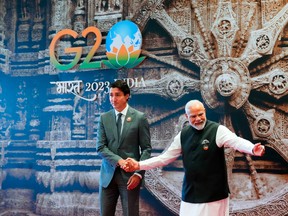Vivek Dehejia: Leave it to Justin Trudeau to further degrade Canada-India relations
The Liberal government appears to see India principally through the lens of domestic diaspora politics

Article content
If Canada-India bilateral relations were in the deep freeze after Prime Minister Justin Trudeau’s gaffe-ridden visit to India in 2018, following last weekend’s G20 summit in New Delhi, they are now officially in the Arctic tundra. The G20 was a perfect opportunity for Trudeau and Indian Prime Minister Narendra Modi to reset the relationship. But it was not to be.
The first early warning sign was the perplexing news that Canada had put a “pause” on the on-again-off-again trade negotiations with India just days before the summit, which we first learned about from the Indian high commissioner to Canada, not the Canadian government.
Warning bells rang again when, at a press conference in Singapore ahead of the G20, Trudeau said that he was going to raise foreign-interference allegations with Modi, setting a hostile tone even before stepping foot in New Delhi.
Things then went from bad to worse. Trudeau wasn’t granted a full-fledged bilateral meeting with Modi, unlike U.S. President Joe Biden and a score of other world leaders, just a 10-minute “pull-aside” for a bit of meaningless chitchat.
At the summit itself, Canadians saw images of an uncomfortable handshake, in which Trudeau pulled away from Modi. Trudeau also opted to skip the official leaders dinner, a serious faux pas that was widely — and correctly — seen as a snub to his host. Trudeau struck no major deals and was all but peripheral to the main business of the summit — and largely invisible, except for a few photo opportunities with other western leaders.
With little accomplished, the most widely discussed part of Trudeau’s brief visit to India was the malfunctioning of his official jet, leaving him stranded in New Delhi on Sunday night. This has given rise to innumerable social media memes, as Trudeau’s Bollywood costumes did in 2018.
It’s hard to believe that this fiasco of a visit actually managed to worsen the bilateral relationship between the two countries, but that’s what happened. The final readouts by Canada and India made it seem like they were at two different events.
Canada reiterated its concern about alleged foreign interference by India; and India repeated its claim that the Canadian government winks at the anti-India rhetoric espoused by some elements of the Sikh-Canadian diaspora, who haven’t given up on the hope of Khalistan, a putative independent homeland for the Sikhs in the Indian state of Punjab.
What’s deeply regrettable is that the Trudeau government had the right idea when, following the lead of the Americans, Canada’s Indo-Pacific strategy document from last year implied a tilt toward India as a counterweight in the region to an increasingly assertive and belligerent China under its strongman leader, Xi Jinping.
Unfortunately, rather than taking a strategic, realpolitik view of India, the Trudeau government appears to see India principally through the lens of domestic diaspora politics. Sikh-Canadians have been loyal Liberal voters over the years, and their concentration in key ridings in the Toronto and Vancouver areas makes them far more consequential than their small percentage of the population would suggest.
Ignoring the bigger picture, Trudeau has consistently played to the diaspora gallery when it comes to India. In 2018, Jaspal Atwal, a British Columbia man convicted and jailed for attempting to murder a visiting Indian state minister, ended up on the official invitation list for a private reception hosted by Trudeau on his India trip.
Recall, too, when speaking to a group of Sikh-Canadians in November 2020, Trudeau said that he supported the farmer protests in India, which had jammed up the highways in and around New Delhi for months. The protesters were largely Punjabi Sikhs and, pointedly, Trudeau made his remarks on a day celebrating the founder of the Sikh religion. Indian officials took umbrage, seeing this as attempted interference in their domestic political affairs.
His poor showing at the G20 is yet another sorry chapter in Trudeau’s mishandling of what could, and should, have been an important bilateral relationship, apparently prioritizing partisan electoral calculations over Canada’s global strategic interests.
National Post
Vivek Dehejia is associate professor of economics at Carleton University.













Postmedia is committed to maintaining a lively but civil forum for discussion. Please keep comments relevant and respectful. Comments may take up to an hour to appear on the site. You will receive an email if there is a reply to your comment, an update to a thread you follow or if a user you follow comments. Visit our Community Guidelines for more information.